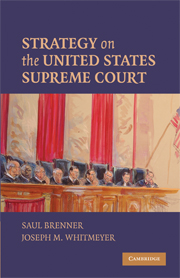Book contents
- Frontmatter
- Contents
- Preface
- PART I INTRODUCTION
- PART II CERTIORARI
- PART III THE CONFERENCE VOTE ON THE MERITS
- PART IV THE MAJORITY OPINION AND OTHER OPINIONS
- PART V THE FINAL VOTE ON THE MERITS
- 12 The Separation of Powers Model
- 13 Supreme Court Decision Making and Public Opinion
- PART VI CONCLUDING CHAPTERS
- Appendix 1 Decision Making on the United States Supreme Court
- Appendix 2 Additional Questions to Explore
- References
- Table of Cases
- Index
13 - Supreme Court Decision Making and Public Opinion
Published online by Cambridge University Press: 05 June 2012
- Frontmatter
- Contents
- Preface
- PART I INTRODUCTION
- PART II CERTIORARI
- PART III THE CONFERENCE VOTE ON THE MERITS
- PART IV THE MAJORITY OPINION AND OTHER OPINIONS
- PART V THE FINAL VOTE ON THE MERITS
- 12 The Separation of Powers Model
- 13 Supreme Court Decision Making and Public Opinion
- PART VI CONCLUDING CHAPTERS
- Appendix 1 Decision Making on the United States Supreme Court
- Appendix 2 Additional Questions to Explore
- References
- Table of Cases
- Index
Summary
In most cases decided by the Court, the general public does not know that the Supreme Court has decided the case and, if they did know, would not have an opinion whether the case was decided correctly or not. In this chapter, however, we are interested in cases in which the general public knows that the Court has decided the case and has an opinion regarding that decision.
More specifically, we will attempt to answer two questions. First, do the justices attempt to avoid handing down individual decisions that are likely to be perceived negatively by the general public? Second, is the Court likely to be influenced by the “public mood?”
A justice, concerned with the possible negative reaction by the general public to a given decision, might ask herself the following questions: (1) Is it likely that the general public will react negatively to a given possible decision? (2) If it reacts negatively, will such reaction result in a loss of support for the Court? (3) If the general public is less supportive of the Court because of its negative reaction to a given possible decision, will that affect the Court's effectiveness? and (4) If it affects the Court's effectiveness, am I better off deciding the case based on my preferences or should I avoid handing down the decision to avoid the harm? Our reading of Baum (2006, p. 17) influenced our formulation of these four questions.
- Type
- Chapter
- Information
- Strategy on the United States Supreme Court , pp. 127 - 136Publisher: Cambridge University PressPrint publication year: 2009

